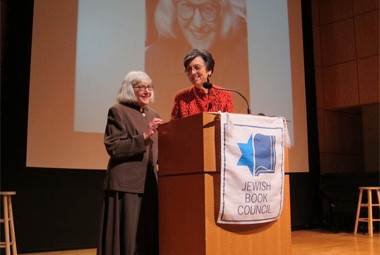Personal triumphs and tragedies dominate book awards
National Jewish Book Awards marks 60th year
Israeli novelist David Grossman ascended the podium at the Center for Jewish History in Manhattan on March 9, as he prepared to accept the 2010 National Jewish Book Award in fiction for his poignant novel, "To The End of the Land." Some 200 guests enthusiastically applauded.
Grossman was one of 25 honorees in 19 categories at the ceremony. The winners, called up by Tablet Magazine editor Alana Newhouse and Columbia journalism professor Ari Goldman.
Grossman’s novel captures the tension between the fear that permeates Israeli life and the cathartic wholeness of family. “It is difficult and heroic to maintain a routine of family,” he said about both himself and Ora, the main character of his novel, searches for her own courage as her son re-enlists as a soldier. It is a theme that hits home for Grossman, whose son Uri, 20, was killed in combat during the Second Lebanon War.
Behind these authors’ successes lies the realization that “any writing worth reading is an act of love,” as winning author Haya Leah Molnar said. Sponsored by the he Jewish Book Council, the event is the longest running award of its kind, aiming to stimulate the writing and reading of substantial Jewish literature.
This year marked the 60th year of the awards. Past honorees include literary giants Leon Uris, Philip Roth, Abraham Joshua Heschel, Mordecai Kaplan, Amos Oz and A.B Yehoshua.
Ann Redisch Stampler, “connects us with our heritage in ways that nothing else can,” Stampler won her award in the category of Illustrated Children’s Books Award for The Rooster Prince of Breslov.
Many of the winning narratives found their connection in Soviet and European Jewry, such as Gal Beckerman’s “When They Come For Us, We’ll Be Gone,” Christopher Browning’s “Remembering Survival: Inside a Nazi Slave-Labor Camp,” and Molnar’s “Under a Red Sky: Memoir of a Childhood in Communist Romania.” Israel provided the inspiration for NBC correspondent Martin Fletcher in “Walking Israel: A Personal Search for the Soul of a Nation,” and Jonathan Schneer’s “The Balfour Declaration: The Origin of the Arab-Israeli Conflict.”






